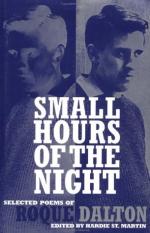|
This section contains 4,067 words (approx. 14 pages at 300 words per page) |

|
SOURCE: “Salvadoran Revolutionary Poetry,” in Literature and Politics in the Central American Revolutions, University of Texas Press, 1990, pp. 115-43.
In the following excerpt, Beverley and Zimmerman discuss the relation of Dalton's poetry to the historical events and the revolutionary movements of Central America in the 1950s, 60s, and 70s.
The most compelling poet of the Committed Generation and the central figure in modern Salvadoran literature is clearly [Roque] Dalton. He writes as a Marxist-Leninist from within the ideological and organizational boundaries of the sectarian left in El Salvador. Though he shares with [Nicaraguan poet Ernesto] Cardenal a concern with producing a syncretic historical image of his country, his tone differs markedly from the religiously inflected high seriousness of exteriorism. Partly derived from Brecht, Nazim Hikmet, Castillo, and Nicanor Parra's cynical “antipoems,” partly from Geoffroy Rivas and Escobar, his poetry is both self-absorbed and self-mocking, secular, antiprophetic, aphoristic, didactic...
|
This section contains 4,067 words (approx. 14 pages at 300 words per page) |

|


